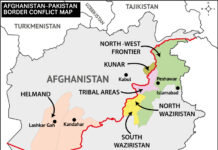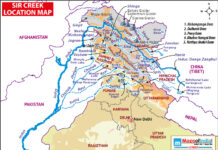
Poonch is located in the Indian state of Jammu & Kashmir. It is near to Pakistan’s border. As a result, fighting occasionally breaks out there
A few days ago, some Indian soldiers were attacked in Poonch. It was a very sad day. The people who attacked them were believed to be terrorists.
They only struck the locations they thought the terrorists were hiding because they carried out a precision strike. The army sought to keep people secure and prevent such attacks. — What Was the Army’s Motivation? The army’s goal was to stop the criminals who were harming the soldiers. They surveyed the area, located the terrorists, and prepared an assault. However, they used extreme caution. They didn’t want to harm regular people, such as families, kids, or business owners.
Poonch’s Heartbreak: Our People Hurt
Our strikes were meant to protect us, but Pakistan’s response was like a knife in our heart. Hours after “Operation Sindoor,” they closed their skies and started firing shells and mortars across the LoC. Poonch, our lovely district in Jammu with its green hills, turned into a warzone.
Our people were stuck in a bad dream. The shelling was brutal, hitting our army posts and our neighborhoods. Houses fell apart, schools closed, and even holy places—a Gurudwara and a mosque—got damaged.
At least 15 of our people died, including four kids, their smiles gone forever. Among them were 10-year-old M Zain Khan and 12-year-old Zoya Khan, and their loss hurts us all so much. Over 50 others were injured, their cries filling the air.
The destruction forced thousands to run—mums, dads, kids leaving with nothing but fear. Schools and colleges in Poonch and nearby areas shut down, and our officials worked fast to set up camps for families with no homes left.
The attacks didn’t care about religion—our Sikh and Muslim brothers and sisters cried together, their pain the same. Narinder Singh, a Sikh leader, said this loss “breaks our hearts into pieces.” The Gurudwara, our place of peace, was hurt, and it felt like a wound to our soul.
Staying Strong Through Tears
Poonch’s people, who’ve seen tough times before, faced this pain with heavy hearts but brave spirits. Minister Javed Ahmed Rana wept for our losses, but called for us to remain unified – his words felt like a dim light in a dark tunnel.
The Shiromani Akali Dal, our robust Sikh community, vocally condemned the attack against the Gurudwara and expressed their solidarity with our soldiers, sending the message that we are all part of one family. People in Pakistan-administered Kashmir across the LoC were also running, as their life was disrupted by this lunacy.
It is sad to say, but when it comes to all of this, it is always the common people who endure the most suffering
Karnah Tehsil and Kupwara District
The Indian state of Jammu and Kashmir’s northern region contains the district of Kupwara. Karnah is an administrative division (tehsil) in Kupwara that is located close to the Line of Control (LoC), which is the de facto border between India and Pakistan. The Sadhna Pass, a high-altitude mountain pass renowned for its difficult terrain and weather, connects Karnah to the district headquarters in Kupwara town, which is about 78 kilometres away.
Incident in Karnah
On the evening of May 7, 2025, a fire broke out in Kandi village, located in the Karnah area of Kupwara district. The fire damaged three residential residences that belonged to Raja Abdul Majid Khan and his sons, Raja Amjad Khan and Raja Asif Khan. Preliminary investigations suggest that a short circuit may have caused the incident. Locals expressed concern about the fire department’s slow response, pointing out that the firefighter arrived an hour after being alerted and only carried 500 liters of water.
Security Situation
In addition to the fire incident, there have been reports of cross-border shelling in the Karnah area. On the evening of May 7, 2025, the armies of India and PakistanPeople in the neighboring villages of Kandi and Dildar were terrified by the firefight. The unprovoked shelling from the other side of the border prompted a response from the Indian Army.
Effects on Local Citizens
Tensions in the Karnah region have increased as a result of the fire incident and cross-border firing. Concerns over their safety and the effectiveness of emergency response services have been voiced by locals. To properly handle such crises, local authorities are recommended to improve their reaction and readiness systems.
Twin Crises in Karnah: Fire Ravages Homes, Shelling Sparks Panic in Kupwara Border Villages
On May 7, 2025, the Karnah area of Kupwara district in Jammu and Kashmir faced a double tragedy that left the border villages in fear and despair. In Kandi village, a massive fire broke out late at night, gutting three houses belonging to Raja Abdul Majid Khan and his sons. Locals blamed a short circuit and criticized the delayed arrival and poor preparedness of the fire department, which struggled with limited water supply and arrived nearly an hour late. As families battled flames and loss, another wave of fear gripped the region when heavy cross-border shelling erupted between Indian and Pakistani forces near the Madayan and Toli army posts. Residents in Kandi and Dildar villages were forced indoors as the sound of gunfire echoed through the night, compounding the chaos. These twin incidents—one natural, one man-made—have once again exposed the everyday risks faced by those living along the Line of Control, where life is constantly caught between danger and uncertainty.
*India vs. Pakistan: Two Half Stories, One Sad Story*
The strikes generated much controversy, with each side sticking to their spin. We said it was “Operation Sindoor” to keep our people safe, and we had to stop the terrorists that attack us. We blamed Pakistan for allowing LeT and JeM to operate with impunity.
Pakistan, though, said we crossed a line, attacking their land and hurting their people. They talked about losses we didn’t cause, and we called it lies, but all this fighting just made things worse.
The World Sees Our Pain
The world watched, their hearts heavy for us. Countries like France, Russia, and Israel said we were right to fight back after Pahalgam’s pain. But everyone’s worried about what’s next—India and Pakistan both have nuclear weapons, so things could get really bad.
At home, the strikes made us proud—people like Shashi Tharoor cheered how well they were done, showing we won’t back down. But Poonch’s losses made us sad too, and many started asking for peace to save more lives.
Our Land Needs Healing
This isn’t just another fight in our long struggle with Pakistan—it’s a cry from a land that’s been hurting since 1947. Kashmir, the heart of our pain, is a place we’ve fought over with tears and blood, every attack leaving deeper scars.
Our strikes show we’re tired of waiting for Pakistan to stop the terror coming from their side. But Poonch’s pain tells us clearly: fighting alone can’t fix this.
Every strike, every shell, hurts our people more—Pahalgam’s victims, Poonch’s homeless.
With the danger of nuclear weapons, we need to step back from this edge. The real fight is to stop terror at its roots. We want Pakistan to shut down groups like LeT and JeM. They need to show they want peace, not just blame us.
Without talking to each other, this cycle of sadness will keep going, and our Poonch will keep crying.
A Hope From Our Heart
As Poonch tries to pick up the pieces, the pain we feel is overwhelming—kids gone, homes in ruins, our people scared. “Operation Sindoor” hit the terrorists hard, but Pakistan’s response made sure we all felt the hurt.
Conclusion: Striking a Balance Between Security and Stability
India is willing and able to use force to defend its borders when provoked, as demonstrated by the precision strikes in Poonch. They also draw attention to the tenuous calm that exists in border districts, which can be broken in a matter of minutes.
In addition to bolstering its defense plans, India must invest in local development, diplomacy, and long-term peace projects.. They also highlight the fragile stability that could be destroyed in just a few seconds in border areas.
India requires to drive acquisitions in peace-building industries, diplomacy, and local development in addition to supporting its security procedures. Just then would the individuals of Poonch be capable of living without constantly fearing that they might get caught in the crossfire.
Poonch is even under attack, both physically and figuratively, for the time being. However, there is still desire that the area will one day be recognized more for its natural beauty than its conflicts if cautious measures and a clear vision are taken.



